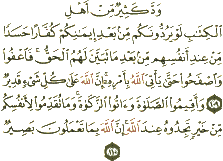|
109.
"many of the people of the (earlier) book wish they could turn you back
to
be infidels, after you have believed,
out
of their own envy, even after thr truth was manifest to them.
(neverthless)
forgive and overlook till allah brings about
his kommand, truly allah has power over all things."
110.
" and keep up the prayer, and pay the poor-rates; whatever good you
shall
forward for yourselves, you shall find it with allah;
surely
allah sees what you do." commentary:
envy and obstinacy
there were many members of the
people of the book, especially those of
the jews, who not only disbelieved
in islam but they also urged the believers
to abandon their faith. their
motive, for this action, was nothing but envy.
through the above mentioned
verses, the qur'an addresses this matter by
saying:
"many of the people of the
(earlier) book wish they could turn you back
to be infidels, after you
have believed, out of thir own envy, even after the
truth was manifest to them.
..."
here, the qur'an bids the believers
to forgive them their evil endeavours
aiming at the destruction of
faith until allah sends his command:
"... (neverteless) forgive
and overlook till allah brings about his
command, truly allah has
power over all things." this is, in fact, a tactical
instruction
given to muslims that they should
stand firm before the intense pressure of
the enemies; and in this particular
circumstance utilize the weapon of
forgiveness while they focus
their abilities upon constructing themselves
and their islamic society, and
wait for the command of allah.
as a great many of the commentators
have said, the purpose of 'the command
of allah ',her, is ' the command
for the holy war 'which at that time had not
been revealed yet. the reason
for the delay may have been that their
conditions were not completely
appropriate for that command. that was why,
according to many of the commentators,
the idea in this verse was changed by
the subsequent verses regarding
' the holy war', which will be referred to
later. *
* * *
the verse following the above
one bids the believers to perform
two great constructive commands.
one of them is about ` prayer '
which establishes a firm relationship
between the servant and his lord.
the second is alms-giving which
is the secret of cohensiveness among
the members of societies. these
two are necessary for defeating
enemies. it says:
" and keep up the prayer,
and pay the poor-rates; ... "
by these two deeds you may strengthen
both your spirit and body.
then, it adds that you should
not think that the good deeds you do and
the material wealth you pay
as poor-rates in the way of allah will be
lost totally. it is not so,
but:
"... whatever good you shall
forward for yourselves, you shall find it
with allah; ..."
"... surely allah sees what
you do."
thus, he definitely knows which
deeds you have done for his
sake and which ones for the
sake of other than him.
|
